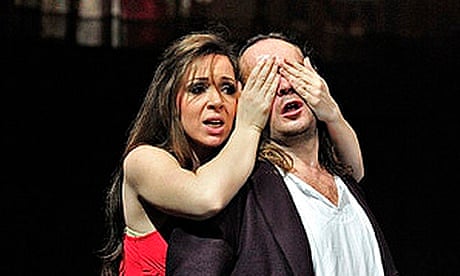Once one of the most popular of Wagner's operas, Tannhäuser is something of a rarity in the UK nowadays, so its appearance as the second work in Theater Freiburg's brief visit to East Anglia was all the more welcome. Perhaps its hero's inner conflict – between sexual and spiritual love – no longer seems as dangerously compelling as it did in the Victorian era, though Wagner's treatment of the subject is characteristically complex. In any case, Eva-Maria Höckmayr's direction gives it further ambiguity by diminishing the distance between Venus – who is here initially dressed as the Virgin Mary – and Elisabeth, who in physically resembles and draws close to draws close to the pagan love goddess in the final scene, as opposed to representing her complete antithesis.
As in all Wagner productions these days, there are idiosyncrasies. Venus's acolytes in the Venusberg orgy are religious zealots, including nuns, who extend inviting hands in an attempt to lure Tannhäuser into joining in their pleasurable activities. Later, the singer of the title role is doubled by an actor (Edward Martens) representing "the old Tannhäuser", who is presumably recollecting the action as he mouths the words both he and Elisabeth once sang.
Yet as the musical performance, in particular, gains steadily in distinction and dramatic momentum under the secure baton of Fabrice Bollon, the lasting impression becomes increasingly positive; the odd moment of weak ensemble work scarcely matters.
Marius Vlad's morally compromised minstrel may lack an ingratiating tenor, but he is tireless in the long and demanding central part. Dana Burešová is a consistently striking Elisabeth, her gleaming tone as focused as her forthright acting; she contrasts perfectly with Astrid Weber's impassioned Venus, while Alejandro Lárraga Schleske's Wolfram is a model of graceful lyricism. Jin Seok Lee is a dominating Landgrave, and the smaller roles are all impressively sung.

Comments (…)
Sign in or create your Guardian account to join the discussion